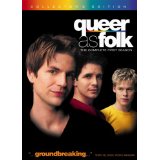
VOTE in our Best of Pittsburgh survey.
Please feel free to this blog or subscribe via RSS. Comments, questions and feedback are always welcome by email.
Drop me a note at

How I love Queer as Folk, let me count the ways...
Over the last few months, I've been re-watching the first season of Queer as Folk, and I just finished the other night. I first discovered Queer as Folk last September when I ordered it from the Carnegie library. It almost instantly became my favorite show, and I watched all twenty-two episodes of Season 1 in a single weekend. Lest you fear this will be a review without criticism, let me assure you, I find Queer as Folk to be by no means a perfect show, but what's good about it is truly, truly amazing.
What's so great about Queer as Folk? On a fundamental level, this show delivers exactly what I look for in any television program—character-driven storytelling. But with the advent of cable-commissioned TV shows, there's a lot of character-driven storytelling going on in small-screen productions today. What makes Queer as Folk so special? First off, it has everything that's great about Sex and the City—style, humor, sex, cosmopolitan living—but it takes place in Pittsburgh. Got to love a show that takes place in Pittsburgh. Now, I admit, it would have been even better if it had been filmed in Pittsburgh, either in whole or in part, á la The Guardian. As is, the show is shot in Toronto and for the most part looks nothing like Pittsburgh. But I'll take what I can get; Pittsburgh is seldom depicted in film with even a modicum of glamour or metropolitan style. Furthermore, Queer as Folk lacks much of the silliness of Sex and the City. Rather there's a good balance of humor and drama, fantasy and reality. And the sex scenes don't hurt. Sure, Sex and the City has plenty of sex scenes, but the bonus of Queer as Folk for straight gals is that we can potentially be attracted to, not just one, but both participants in the sex scene.
Perhaps the best thing to recommend Queer as Folk is Brian Kinney. While this show is fundamentally an ensemble, it cannot help at times but revolve around the moody, charismatic character of Brian, played by Gale Harold.
I do not exaggerate when I say that Brian Kinney is the most fascinating fictional Pittsburgher—ever. He stands as the model of complex and nuanced characterization to which I as a writer aspire. Endlessly fascinating, and not always empathetic, Brian Kinney keeps the audience riveted to find out what he does next—for better or for ill. Brian also lives a fabulous lifestyle, giving us single gals a role model worthy of looking up to.
Unfortunately not all the characters are as entrancing as Brian. One of the biggest problems for me in Season 1—and in most of the later seasons—is the character of Ted Schmidt. In the original British miniseries of Queer as Folk, the Ted character doesn't survive his drug overdose. The American version keeps Ted, and the writers have to pave their own way in figuring out what to do with him as a character. Most of the time, he just ends up being a sad sack who gets pulled into self-destructive situations due to emotional weakness. Sure, this is realistic. There are tons of people like this. But is it fun to watch? No. Other character problems in Season 1 stem from production goofs in exploring and feeling out the characters in this initial season. A stand-out storyline goof, in my estimation, is the subplot of Emmett's attempt to convert himself to being straight at a church group. While this plotline did not strike me one way or the other the first time I watched Season 1, given the character development of Emmett in later seasons, this plotline just didn't ring true to me upon re-watching—though, it did create good opportunities for humor. Another flaw of this show is the "message-y" tone of some of the storylines. I wouldn't go so far as to say it diverges into gay rights propaganda, but it comes close at points. Sometimes it works, but sometimes it gets predictable. By the same token, most straight characters—excepting the few straight cast regulars—tend to get at least semi-villainized, many of these small roles functioning as little more than antagonisms to the main characters. While I have not seen the British version myself, I've read laments that the American version does not put as much time and attention into giving complex and balanced characterization to the straight family members and friends as the British version did.
Despite the flaws, this show remains one of the all-around most glamorous, challenging and entertaining character dramas available on DVD. Hmm... kind of puts me in the mood for a Champagne & Queer as Folk marathon.
 Queer as Folk Season 1 |
Perhaps the best thing to recommend Queer as Folk is Brian Kinney. While this show is fundamentally an ensemble, it cannot help at times but revolve around the moody, charismatic character of Brian, played by Gale Harold.
 The Notorious Brian Kinney |
Unfortunately not all the characters are as entrancing as Brian. One of the biggest problems for me in Season 1—and in most of the later seasons—is the character of Ted Schmidt. In the original British miniseries of Queer as Folk, the Ted character doesn't survive his drug overdose. The American version keeps Ted, and the writers have to pave their own way in figuring out what to do with him as a character. Most of the time, he just ends up being a sad sack who gets pulled into self-destructive situations due to emotional weakness. Sure, this is realistic. There are tons of people like this. But is it fun to watch? No. Other character problems in Season 1 stem from production goofs in exploring and feeling out the characters in this initial season. A stand-out storyline goof, in my estimation, is the subplot of Emmett's attempt to convert himself to being straight at a church group. While this plotline did not strike me one way or the other the first time I watched Season 1, given the character development of Emmett in later seasons, this plotline just didn't ring true to me upon re-watching—though, it did create good opportunities for humor. Another flaw of this show is the "message-y" tone of some of the storylines. I wouldn't go so far as to say it diverges into gay rights propaganda, but it comes close at points. Sometimes it works, but sometimes it gets predictable. By the same token, most straight characters—excepting the few straight cast regulars—tend to get at least semi-villainized, many of these small roles functioning as little more than antagonisms to the main characters. While I have not seen the British version myself, I've read laments that the American version does not put as much time and attention into giving complex and balanced characterization to the straight family members and friends as the British version did.
Despite the flaws, this show remains one of the all-around most glamorous, challenging and entertaining character dramas available on DVD. Hmm... kind of puts me in the mood for a Champagne & Queer as Folk marathon.
2007-05-24 13:40:43 GMT
Comments (1 total)